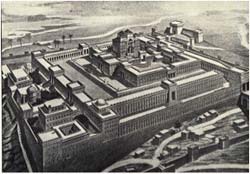 Parshat Re’eh (Deuteronomy 11:26–16:17 — Demonstrates the power of vision and free choice.
Parshat Re’eh (Deuteronomy 11:26–16:17 — Demonstrates the power of vision and free choice.
The Shorashim Torah Study and Overview Guide
Moshe tells the people to use their power of sight and “see that I place before you today a blessing and a curse.”
Why dose G-d tell them to use the power of sight if in fact it is that power that can get them into so much trouble?
Moshe further states, “the blessing, when ye shall hearken unto the commandments of the LORD your God, which I command you this day; 28 and the curse, if ye shall not hearken unto the commandments of the LORD your God, but turn aside out of the way which I command you this day, to go after other gods, which ye have not known.”
With the blessings it says asher — when ye shall hearken — and with the curses it says eem lo — if ye shall not hearken.
What are we to learn from that difference?
These blessings and curses are to be proclaimed on Mount Gerizim and Mount Ebal when the people cross over into the Holy Land.
Why then ?
Then Moshe reiterates the importance of the Temple in the place “that G-d will choose to make dwell His name there.” Throughout the portion the fact that this temple must be in the place “That G-d chooses” is repeated constantly
What are we to learn from that?
Yet the exact location is not revealed.
What are we to learn from that?
Moshe then explains that from now on it is permitted to slaughter animals elsewhere as a way to prepare meat for meals. Yet a sacrifice and a gift to G-d can only be presented at the temple. Moshe then describes the dangers of a false prophet. He says (Deuteronomy 13) 2 If there arise in the midst of thee a prophet, or a dreamer of dreams–and he give thee a sign or a wonder, 3 and the sign or the wonder come to pass, whereof he spoke unto thee–saying: ‘Let us go after other gods, which thou hast not known, and let us serve them’; ד 4 thou shalt not hearken unto the words of that prophet, or unto that dreamer of dreams; for the LORD your God putteth you to proof, to know whether ye do love the LORD your God with all your heart and with all your soul.
What does that teach us about miracles and their relative importance?
What does that teach us about miracles and their relative importance?
Moshe repeats a description of the identifying signs for kosher animals and fish, and the list of non-kosher birds . He also describes the concepts of tithing, charity, the sabbatical year and ends with a reiteration of the three pilgrimage festivals.
What do all these have to do with the power of “Seeing” stressed in the beginning of the Torah portion?
Listen to this week’s podcast: